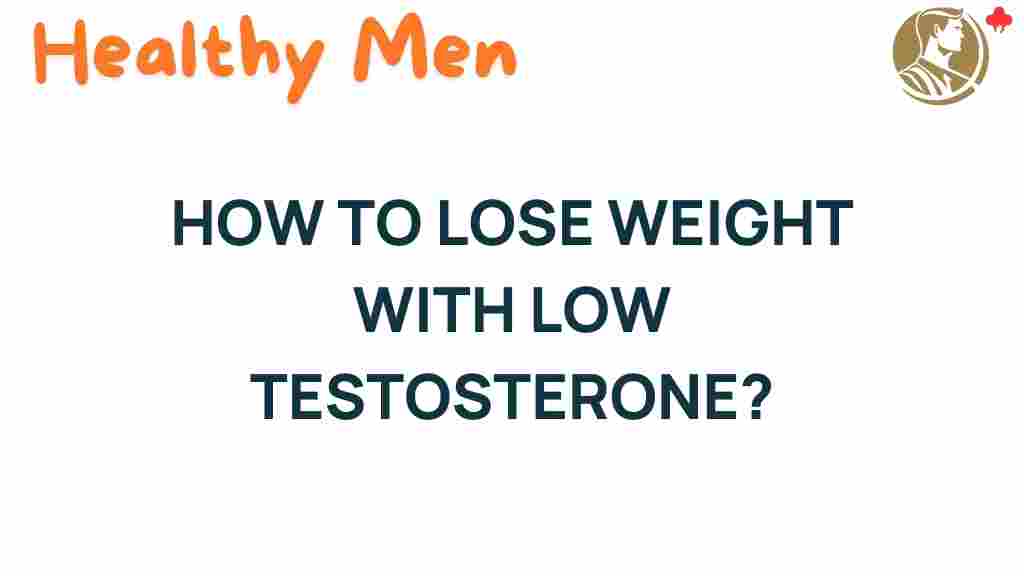Unveiling the Secrets: Weight Loss Strategies for Low Testosterone
Low testosterone levels can significantly impact a person’s overall health and fitness, making weight loss a challenging endeavor. The relationship between hormones and weight management is complex, but understanding it can lead to effective strategies for achieving your weight loss goals. This article will explore various weight loss strategies specifically tailored for individuals dealing with low testosterone, emphasizing diet, exercise, lifestyle modifications, and overall well-being.
Understanding Low Testosterone and Its Impact on Weight Loss
Testosterone is a vital hormone in both men and women, playing critical roles in muscle mass, fat distribution, and overall metabolic health. Low testosterone levels can lead to:
- Increased body fat
- Decreased muscle mass
- Lower energy levels
- Reduced motivation for physical activity
These factors can create a cycle that makes weight loss more difficult. However, by implementing targeted strategies, individuals can combat these challenges and improve their health and fitness.
Step-by-Step Weight Loss Strategies
1. Optimize Your Diet
The first step in any weight loss journey is to evaluate and optimize your diet. Here are some effective dietary strategies:
- Prioritize Protein: Increasing protein intake can help in building muscle mass, which is crucial for boosting metabolism. Aim for lean sources like chicken, fish, eggs, and legumes.
- Healthy Fats: Incorporate healthy fats such as avocados, nuts, and olive oil. These can help maintain hormonal balance.
- Complex Carbohydrates: Focus on whole grains, fruits, and vegetables to provide sustained energy without spiking insulin levels.
- Limit Processed Foods: Reduce intake of sugars and refined carbohydrates that can lead to weight gain.
Consider consulting a nutritionist to create a personalized meal plan that aligns with your weight loss goals and hormonal health.
2. Incorporate Regular Exercise
Exercise is crucial for enhancing overall health and promoting weight loss. Here are some tailored exercise strategies:
- Strength Training: Incorporate weight lifting or resistance training at least 2-3 times a week. This helps build muscle, which can improve testosterone levels and metabolic rate.
- Cardiovascular Workouts: Engage in moderate-intensity aerobic activities like walking, jogging, or cycling for at least 150 minutes a week.
- High-Intensity Interval Training (HIIT): Short bursts of intense exercise can be very effective for burning fat and improving hormonal balance.
Strength training is particularly beneficial as it not only aids in weight loss but also enhances muscle mass, which is essential for those with low testosterone.
3. Focus on Lifestyle Changes
Your lifestyle choices play a significant role in managing low testosterone and achieving weight loss. Consider the following:
- Improve Sleep Quality: Aim for 7-9 hours of quality sleep per night. Poor sleep can negatively impact testosterone levels and weight management.
- Manage Stress: High-stress levels can lead to hormonal imbalances. Practice stress-reducing techniques such as yoga, meditation, or mindfulness.
- Stay Hydrated: Drink plenty of water throughout the day. Proper hydration supports metabolic health and overall well-being.
4. Monitor Your Progress
Tracking your progress can help keep you motivated and accountable. Here are some tips:
- Keep a Food Diary: Documenting what you eat can help you identify patterns and areas for improvement.
- Regular Weigh-Ins: Weigh yourself weekly to monitor changes in your body weight.
- Set Realistic Goals: Establish achievable weight loss goals to maintain motivation.
Troubleshooting Tips for Weight Loss Challenges
Despite your best efforts, you may encounter challenges in your weight loss journey. Here are some troubleshooting tips:
- Consult a Healthcare Professional: If you suspect low testosterone is affecting your weight loss, consider getting tested and discussing treatment options with a doctor.
- Reassess Your Diet: If you’re not seeing results, revisit your dietary choices and make necessary adjustments.
- Vary Your Exercise Routine: If your body adapts to your current regimen, try new workouts or increase intensity to challenge yourself.
Remember, weight loss is a journey that requires patience and persistence, especially when dealing with low testosterone.
Conclusion
Achieving weight loss with low testosterone involves a multifaceted approach that includes optimizing your diet, incorporating regular exercise, and making lifestyle changes. By focusing on these areas, you can improve your health and fitness, enhance hormonal balance, and ultimately achieve your weight loss goals. Embrace these strategies as part of your journey to better well-being.
For more information on how hormones affect weight loss, check out this comprehensive guide. And remember, every small change can lead to significant results over time!
This article is in the category Fitness and created by healthymen Team
